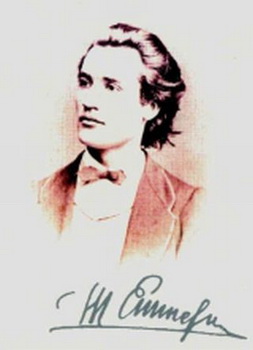|
"Glossa" is the title of a poem from the gloss genus, published in 1883 in the first volume of poems of the Romanian National Poet: Mihai Eminescu. The poem is the most Buddhist poem of Eminescu in which some ideas are infiltrating through the philosophy of Schopenhauer and others through the fundamental Buddhist book, Dhammapada.
In literature, the word "glossa" is a verse which follows and comments on a refrain. The fixed-form poetry, "Glossa" by Mihai Eminescu, is composed of a theme verse or a core stanza that will be resumed with the reverse order of the verses at the end of the text. Besides these two stanzas, each theme line will be explained, glossed in an equal number of stanzas.
The topic of the poem is an ethical code of the superior man which offers teachings to people, based on self-knowledge and on his philosophical experiences. The poem is also a reflection, containing universally valid truths, therefore uncontestable. The apophthegms, the sentences are short and lapidary, concise and expressed by a single verse. The phlosophical topic of "Glossa" is the condition of man with regard to time.
Time goes by, time comes along,
All is old and all is new;
What is right and what is wrong,
You must think and ask of you;
Have no hope and have no fear,
Waves that rise can never hold;
If they urge or if they cheer,
You remain aloof and cold.
To our sight a lot will glisten,
Many sounds will reach our ear;
Who could take the time to listen
And remember all we hear?
Keep aside from all that patter,
Seek yourself, far from the throng
When with loud and idle clatter
Time goes by, time comes along.
Nor forget the tongue of reason
Or its even scales depress
When the moment, changing season,
Wears the mask of happiness -
It is born of reason's slumber
And may last a wink as true:
For the one who knows its number
All is old and all is new.
Be as to a play, spectator,
As the world unfolds before:
You will know the heart of matter
Should they act two parts or four;
When they cry or tear asunder
From your seat enjoy along
And you'll learn from art to wonder
What is right and what is wrong.
Past and future, ever blending,
Are the twin sides of same page:
New start will begin with ending
When you know to learn from age;
All that was or be tomorrow
We have in the present, too;
But what's vain and futile sorrow
You must think and ask of you;
For the living cannot sever
From the means we've always had:
Now, as years ago, and ever,
Men are happy or are sad:
Other masks, same play repeated;
Diff'rent tongues, same words to hear;
Of your dreams so often cheated,
Have no hope and have no fear.
Hope not when the villains cluster
By success and glory drawn:
Fools with perfect lack of luster
Will outshine Hyperion!
Fear it not, they'll push each other
To reach higher in the fold,
Do not side with them as brother,
Waves that rise can never hold.
Sounds of siren songs call steady
Toward golden nets, astray;
Life attracts you into eddies
To change actors in the play;
Steal aside from crowd and bustle,
Do not look, seem not to hear
From your path, away from hustle,
If they urge or if they cheer;
If they reach for you, go faster,
Hold your tongue when slanders yell;
Your advice they cannot master,
Don't you know their measure well?
Let them talk and let them chatter,
Let all go past, young and old;
Unattached to man or matter,
You remain aloof and cold.
You remain aloof and cold
If they urge or if they cheer;
Waves that rise can never hold,
Have no hope and have no fear;
You must think and ask of you
What is right and what is wrong;
All is old and all is new,
Time goes by, time comes along.
"Glossa", by Mihai Eminescu (1883)

 |
 Gnostic Knowledge
Gnostic Knowledge  Glossa by Mihai Eminescu
Glossa by Mihai Eminescu 



